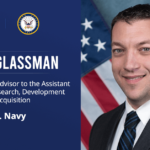Latest

Articles / 1 day ago
Former Space Force CTIO Lisa Costa on Her Transition to Industry, Today’s GovCon Market & More

Articles / 4 days ago
The US Navy’s New GenAI Tool: What GovCons Should Know

Articles / 6 days ago
Jeth Rey Shares What’s Next for Army Cyber Strategy After Zero Trust

Articles / 1 week ago
US Navy’s Joel Uzarski, NavalX Director, to Keynote 2025 Navy Summit

Articles / 1 week ago
Missile Defense Agency Director Heath Collins Confirmed to Keynote Air & Space Summit

Articles / 2 weeks ago
Army CIO Garciga Targeting ‘Butts in Seats’ in Contracting Reform

Articles / 3 weeks ago
Agentic AI and Supply Chains: What GovCons Should Know

Articles / 3 weeks ago
Top 5 Benefits of Attending the 2025 DOD Summer Series

Articles / 3 weeks ago
Former CIA Official Shares How AI Can Help Defend Organizations’ Cyber Assets

Articles / 4 weeks ago
Where the Army Stands in Its Unified Network Mission
Featured Articles
Executive Spotlights

Member News / 7 months ago
Executive Spotlight: Jason Saldana of Modern Technology Solutions, Inc.

Member News / 12 months ago
Executive Spotlight: Justin Fessler, VP of Public Sector at LogicMonitor
Cybersecurity

Cybersecurity / 11 months ago
Industry Officials Call for AI Regulation Harmonization

Cybersecurity / 11 months ago
NSA, FBI Warn of North Korea-Backed Cyber Espionage
Defense and Intelligence

Defense and Intelligence / 11 months ago
OSC Seeks Industry Feedback on New Loan Program

Defense and Intelligence / 11 months ago
SES Space & Defense Wins US Army Satellite Communications Contract
Federal Civilian

Federal Civilian / 11 months ago
USAID Introduces Digital Policy to Advance Open Digital Ecosystems

Federal Civilian / 11 months ago
HHS Restructures to Consolidate Tech, Data, AI Capabilities
Space

Space / 11 months ago
Proof of Capability Seen as Challenge to SDA's Multi-Contractor Approach on Proliferated Satellite Architecture

Space / 11 months ago
NASA Completes Commercial Space Station Component Burst Pressure Test
DIGITAL MODERNIZATION

Digital Modernization / 11 months ago
F5 Joins DOD Enterprise Software Initiative BPA With Carahsoft

Digital Modernization / 11 months ago








